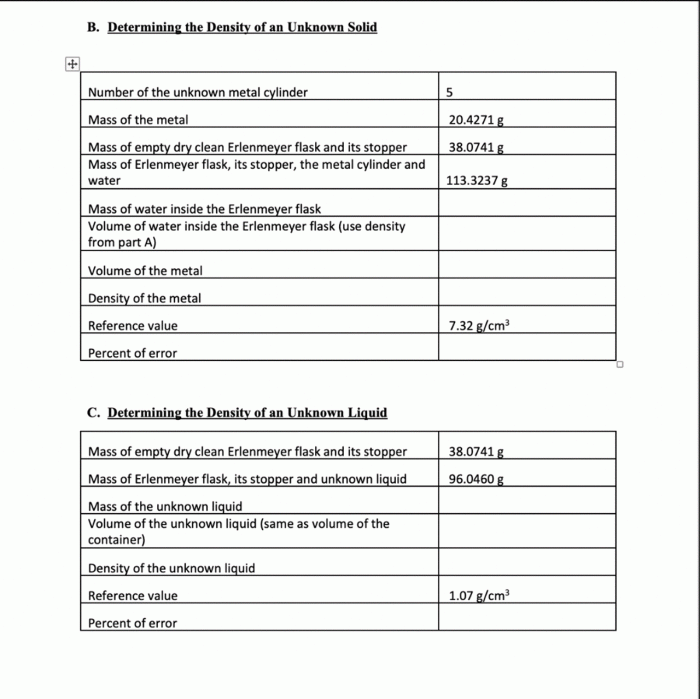Advance study assignment densities of solids and liquids – In the realm of science, the densities of solids and liquids play a pivotal role in understanding the behavior and properties of matter. This advanced study assignment delves into the intricate world of density, exploring its significance, measurement techniques, influencing factors, and practical applications.
As we embark on this journey, we will unravel the mysteries that lie at the heart of matter’s compactness.
Density, a fundamental property of substances, serves as a quantitative measure of their mass per unit volume. It holds immense value in comprehending the behavior of materials, enabling scientists and engineers to design and optimize countless applications across diverse fields.
Introduction: Advance Study Assignment Densities Of Solids And Liquids

Solids and liquids are two distinct states of matter with unique properties. Solids have a definite shape and volume, while liquids assume the shape of their container and have a definite volume. Density is a crucial property that describes the mass per unit volume of a substance.
Understanding the density of solids and liquids is essential for comprehending their behavior and applications in various fields.
Methods for Determining Density

Mass-Volume Method
This method involves measuring the mass and volume of a sample. Density is then calculated by dividing mass by volume. It is a straightforward and widely used method for determining the density of solids and liquids.
Archimedes’ Principle, Advance study assignment densities of solids and liquids
Archimedes’ principle states that the upward buoyant force exerted on an object submerged in a fluid is equal to the weight of the fluid displaced by the object. By measuring the weight of an object in air and then in a fluid, the density of the object can be determined.
Pycnometry
Pycnometry involves using a pycnometer, a specialized glass container with a known volume. The pycnometer is filled with a liquid of known density, and the mass of the pycnometer and liquid is measured. Then, the liquid is replaced with the sample, and the mass is measured again.
The density of the sample can be calculated using the difference in mass and the known volume of the pycnometer.
Factors Affecting Density
Temperature
Temperature can significantly affect the density of substances. In general, the density of solids and liquids decreases with increasing temperature due to thermal expansion.
Pressure
Pressure can also influence the density of substances. For most solids and liquids, density increases with increasing pressure.
Composition
The composition of a substance plays a crucial role in determining its density. Different elements and compounds have different densities, affecting the overall density of the substance.
Applications of Density

Engineering
Density is crucial in engineering for designing structures, bridges, and vehicles. It helps determine the weight and buoyancy of objects and structures.
Chemistry
Density is used in chemistry to identify and characterize substances. It aids in determining the purity of compounds and helps in separating mixtures through techniques like centrifugation.
Medicine
Density is used in medicine for diagnostic purposes. For example, bone density measurements are used to assess bone health and diagnose osteoporosis.
Essential FAQs
What is the significance of density in understanding the behavior of substances?
Density provides crucial insights into the compactness and mass distribution within a substance. It allows scientists to predict and analyze the behavior of materials under various conditions, such as temperature and pressure changes.
How do intermolecular forces influence the density of a substance?
Intermolecular forces play a significant role in determining the density of a substance. Stronger intermolecular forces, such as those in solids, result in higher densities due to the tightly packed arrangement of molecules. Conversely, weaker intermolecular forces, as found in liquids, lead to lower densities due to the increased molecular spacing.
What are the practical applications of density in different fields?
Density finds widespread applications in various fields, including engineering, chemistry, and medicine. In engineering, it is used to design and optimize structures, while in chemistry, it helps determine the purity and concentration of solutions. In medicine, density measurements are employed in diagnostic imaging techniques, such as X-ray and ultrasound.